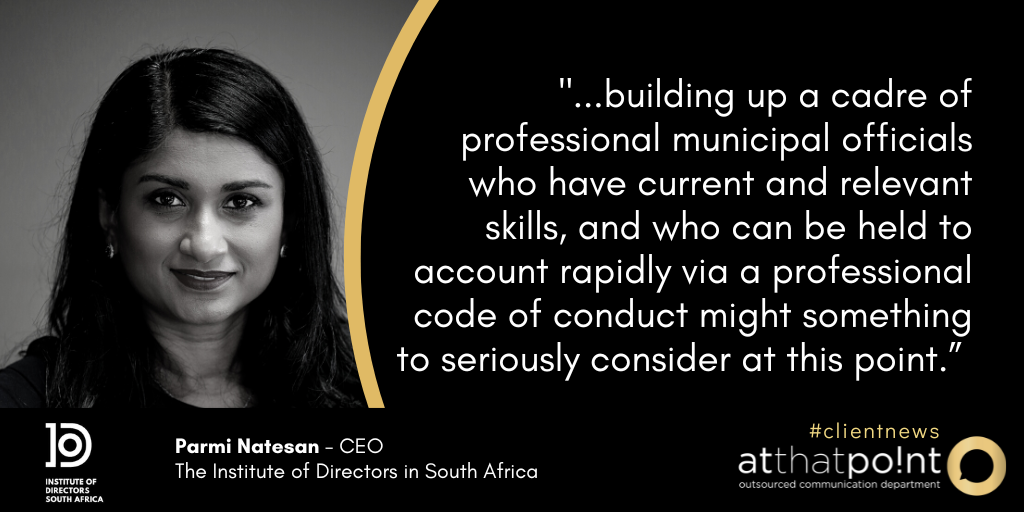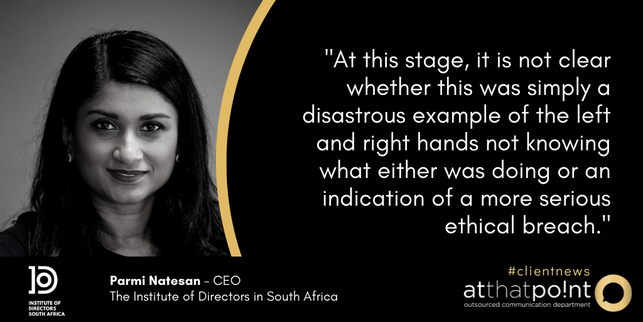Auditor General’s local government report: local government should be professionalised, says IoDSA21/6/2022  The recent report on local government by the Auditor General, Tsakani Maluleke, is a timely reminder of the prevailing dysfunction in municipalities across the country, and the catastrophic impact that is having on all South Africans. The Auditor General is right to lay the blame squarely on the shoulders of municipal leaders, says Parmi Natesan, CEO, Institute of Directors in South Africa (IoDSA)—but perhaps we also need to be talking about professionalising municipal management as well. “There’s a reason that King IV’s first principle concerns leadership because ultimately everything stems from what goes on at the board or council. Principle 1 speaks to the absolute need for ethical leadership, while Principle 10 deals with the imperative to delegate the council’s authority to a competent municipal manager on whom it can rely,” she argues. “King IV’s sector report on municipalities further recommends that councils ensure they have access to ‘professional and independent guidance on corporate governance and its legal duties’ (King IV, p 85).” The theme of the Auditor General’s Consolidated General Report is “Capable leaders should demonstrate change by strengthening transparency and accountability”. The corollary is that we have now to ask whether municipal councils and audit committees have the right leadership of ethical and effective leaders. What criteria are used to appoint municipal councillors and do we know precisely what competencies they need to have in order to discharge their duties properly? she asks, noting that, as the Auditor General pointed out in her report, senior municipal management has been dilatory at best in implementing the detailed recommendations contained in previous reports. Ms Natesan concurs, saying that this state of affairs seems to be the result of decades of incompetence and even criminal behaviour. “However, as noted, the buck stops with the municipal council. Councils are gravely at fault because they do not hold senior management to account for how they fulfil their duties, and they should, in turn, be held accountable,” she says. Constitutionally, the national and provincial governments are bound to assist in strengthening and supporting municipalities to operate effectively (Constitution of the Republic of South Africa, 1996, s154(1)). Section 139 sets out how, in extreme cases, provincial governments can intervene in local government. But, says, Ms Natesan: “Given that these interventions do not necessarily seem to solve the problem, not least because everything is so politicised, are we now not overdue in simply professionalising local government? Municipalities are where most of the really important service delivery actually occurs—or doesn’t occur. As we seem to be entering a period of unstable municipal coalitions that could make the council’s leadership role even less effective, building up a cadre of professional municipal officials who have current and relevant skills, and who can be held to account rapidly via a professional code of conduct might something to seriously consider at this point.” ENDS MEDIA CONTACT: Stephné du Toit, [email protected], 084 587 9933, www.atthatpoint.co.za For more information on the IoDSA please visit: Website: www.iodsa.co.za Twitter: @The_IoDSA LinkedIn: Institute of Directors in South Africa Company Page Facebook: Institute of Directors South Africa
0 Comments
Comair returned to the headlines by advising on 1 June that it was voluntarily suspending its flights until the funding necessary to resume operations had been secured. What has got customers hot under the collar, though, is that it had advertised a one-day sale on the previous day (31 May). While one has to have sympathy for Comair as it struggles to recover from the pandemic and the recent suspension of its licence in March, this “perfect storm” points to some governance lessons, argues Parmi Natesan, CEO, Institute of Directors in South Africa (IoDSA).
“At this stage, it is not clear whether this was simply a disastrous example of the left and right hands not knowing what either was doing or an indication of a more serious ethical breach. But either way, irate customers are putting the blame on the board and the CEO,” she says. Scenario 1—perhaps the most likely—is that the operational teams, such as marketing and sales, introduced the sale to try to get more passengers back into their planes to make up for revenue lost during the suspension of the airline’s licence in March. Because the CEO and his or her executive team are responsible for day-to-day operations, the board would probably not have known the specifics (like the date of the sale) of this operational activity. However, it should have foreseen that, at a time of financial instability, the relevant operational decision-makers were properly briefed. Senior management, serving as the link between the Board and the company’s operations, should certainly have been extra vigilant at this time. “King IV[1] clearly states that ´The CEO should be responsible for leading the implementation and execution of approved strategy, policy and operational planning, and should serve as the chief link between management and the governing body’ (Recommended Practice 77),” she notes. “At the same time, the board has an overall responsibility to govern risk (Principle 11) and, knowing that funding was an issue, should have ensured that operational actions and decisions were informed by an understanding of the current financial risk.” The less likely second scenario, in which the board did know that a sale was planned and cynically allowed it to go ahead, presumably in order to take in some much-needed cash, would imply a serious breach of ethics. King IV is clear that ethics is at the centre of good corporate governance, as shown by the fact that ethics are the subject of Principles 1 and 2. It further makes the point that ethical leadership specifically “involves the anticipation and prevention, or otherwise amelioration, of the negative consequences of the organisation’s activities and outputs on the economy, society and the environment and the capitals that it uses and affects” (King IV, p 20). Another important point made by King IV is that the organisation receives its social licence to operate from its internal and external stakeholders and society at large. This licence is thus a direct by-product of how good a corporate citizen it is. “Already on social media one can see people questioning the ability of Comair to operate successfully again,” Ms Natesan observes. “Whatever the truth of the matter, one thing is clear: Comair has aggravated one of its most important stakeholder groups—its clients—and if it does return to service, the board will have its work cut out to repair a severely damaged reputation alongside all the other challenges it faces.” [1]IoDSA, Report on corporate governance for South Africa 2016, available at https://www.iodsa.co.za/page/king-iv. ENDS MEDIA CONTACT: Stephné du Toit, [email protected], 084 587 9933, www.atthatpoint.co.za For more information on the IoDSA please visit: Website: www.iodsa.co.za Twitter: @The_IoDSA LinkedIn: Institute of Directors in South Africa Company Page Facebook: Institute of Directors South Africa |
Archives
July 2024
Categories
All
|


 RSS Feed
RSS Feed